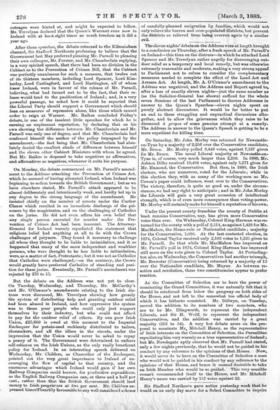On Monday, the debate commenced on Mr. Parnell's amend- ment
to the Address attacking the Prevention of Crimes Act, which he accused of having alienated Ireland, when Ireland was beginning to soften towards the British Government; but as we have elsewhere stated, Mr. Parnell's attack appeared to be almost deliberately and intentionally weak, and hardly led up in any degree to the strong language of the amendment. He insisted chiefly on the number of arrests under the Curfew Clause which resulted in an immediate discharge of the pri- soners by the magistrates, and on the challenging of Catholics on the juries. He did not even affirm his own belief that any single person executed for murder under the Pre- vention of Crimes Act had been innocent. The Attorney- General for Ireland warmly repudiated the statement that religious belief had anything at all to do with the Crown challenges of jurymen. They found it necessary to challenge all whom they thought to be liable to intimidation, and it so happened that many of the more independent and wealthier persons, who wen thought to be less liable to intimidation, were, as a matter of fact, Protestants ; but it was not as Catholics that Catholics were challenged,—on the oontrary, the Crown would greatly have preferred Catholics of standing and posi- tion for these juries. Eventually, Mr. Parnell's amendment was rejected by 133 to 15.


































 Previous page
Previous page